+91 858 886 6045
Haridwar Travel Guide
Introduction
Among India’s most visited pilgrim destinations is Haridwar, a holy city in Uttarakhand. Haridwar is regarded as one of the seven holiest places for the Hindu community. Hairdwar is where the Ganga enters the 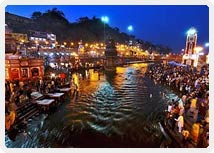 Indo-Gangetic plain of North India for the first time at Haridwar, and this explains how the city derives its ancient name Gangadwára, the place where the Ganges descends to the plains.
Indo-Gangetic plain of North India for the first time at Haridwar, and this explains how the city derives its ancient name Gangadwára, the place where the Ganges descends to the plains.
Hindu mythology tells us that Haridwar is among the four sites where drops of the elixir of immortality spilled over from the pitcher that being carried away by the Vishnu’s celestial bird Garuda, after the samudra manthan or the churning of the milky ocean. These four sites in Ujjain, Haridwar, Nasik and Allahabad are the seats of the Kumbha Mela, celebrated once every 3 years in any of the mentioned places and once in every twelve years , the historic Maha Kumbha Mela at Prayag in Allahabad.
Millions of pilgrims congregate to mark the event. Haridwar is not just a pilgrim destination but also emerging as an industrial city. Today, it is developing beyond its religious importance, as a major industrial district. Haridwar speaks of a rich heritage, both religious and cultural. It is home to numerous havelis and mansions bearing exquisite murals and intricate stonework.
The 'Bhimgoda Dam' is also situated here. Haridwar has also served as a centre for various arts, science and culture. The city is known for its valuable contributions in Ayurvedic medicines and herbal remedies and is home to the unique Gurukul method of traditional education. Hindu traditions have designated five holy spots in Haridwar or the 'Panch Tirth', namely the Har-ki-pauri, Kushwart Ghat, Kankhal, Mansa Devi and Chandi Devi temples. Embark on a spiritual journey and you will find bliss !
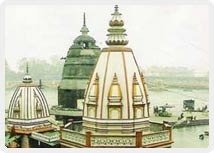 The temple is located on the Neel Parvat, on the Eastern banks of the river Ganga and is dedicated to the Goddess Chandi. Legend tells us that Chanda-Munda, the army chiefs of the local demon king were killed by the Chandi goddess here, after which the place was named Chandi Devi. The main statue was erected by Adi Shankara in the 8th century. The Chandi Devi temple was built in1929 A.D. by the King of Kashmir-Suchat Singh. The temple is accessible by a three kilometers trek from Chandighat or by means of a ropeway.
The temple is located on the Neel Parvat, on the Eastern banks of the river Ganga and is dedicated to the Goddess Chandi. Legend tells us that Chanda-Munda, the army chiefs of the local demon king were killed by the Chandi goddess here, after which the place was named Chandi Devi. The main statue was erected by Adi Shankara in the 8th century. The Chandi Devi temple was built in1929 A.D. by the King of Kashmir-Suchat Singh. The temple is accessible by a three kilometers trek from Chandighat or by means of a ropeway.
Is a multi-storey temple based on the concept of Mother India. Each floor depicts a distinct era in Indian History, right from the Ramayan to post-freedom themes.Elevators help tourists. It is a kind of reverence to all those, who played a vital role in the formation of the country. A glorious statue of Bharat Mata in all her splendour, pictures of Indira Gandhi, and a floor dedicated especially to the achievements of women in India, the Matru Mandir define the experience .'Sant Mandir' is the fourth floor that features great saints from different religions of India. The fifth floor represents the religious diversity in India on its walls. The sixth floor houses Goddess Shakti in her myriad forms like Kali, and Saraswati. While the next is for Vishnu, the last floor is where all the natural beauty culminates to offer a breathtaking view of the Himalayan ranges.
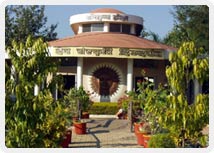 Shanti Kunj, in a nutshell, is a spiritual haven and among the best de-stressing points in India. It brings together ancient techniques of breathing, yoga, to present a its special version of traditional exercises. It also practices Ayurved an ancient medical science. This institution’s each extends to over 76 countries abroad. Shantikunj is a perfect research centre for herbal medicines with severaldoctors and scientists doing research in the area. Eighteen highly qualified and fully devoted doctors and scientists are engaged in this research work. It also offers homeopathic treatment free of cost. Medical Camps and Seminars are also organized here to promote knowledge about the institution and its activities. Visit Shanti Kunj and you will realize that the Haridwar trip is worth it, it helps you relax, distress, have fun and realize spiritual bliss all at one go.
Shanti Kunj, in a nutshell, is a spiritual haven and among the best de-stressing points in India. It brings together ancient techniques of breathing, yoga, to present a its special version of traditional exercises. It also practices Ayurved an ancient medical science. This institution’s each extends to over 76 countries abroad. Shantikunj is a perfect research centre for herbal medicines with severaldoctors and scientists doing research in the area. Eighteen highly qualified and fully devoted doctors and scientists are engaged in this research work. It also offers homeopathic treatment free of cost. Medical Camps and Seminars are also organized here to promote knowledge about the institution and its activities. Visit Shanti Kunj and you will realize that the Haridwar trip is worth it, it helps you relax, distress, have fun and realize spiritual bliss all at one go.
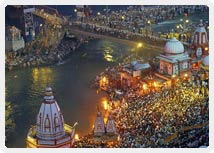 This sacred Ghat was constructed by King Vikramaditya in memory of his brother Brithari who came to Haridwar and meditated on the banks of the river Ganga. Following his death, his brother constructed a Ghat in his name, which later came to be known as Hari-Ki-Pauri.The Ghat bore Vishnu’s footprint and has thus attained the status of a sacred spot. It is also referred to as Brahmakund.Evening visits to the Ghat offer devotees an experience of the aarti to Godess Ganga.A sound and lights show follows, with pilgrims floating diyas and incense sticks on the river, in a dazzling display of illumination that is truly a sight to behold.A bath at this sacred ghat is considered auspicious ,particularly during the Kumbhand the Ardh Kumbh Mela.
This sacred Ghat was constructed by King Vikramaditya in memory of his brother Brithari who came to Haridwar and meditated on the banks of the river Ganga. Following his death, his brother constructed a Ghat in his name, which later came to be known as Hari-Ki-Pauri.The Ghat bore Vishnu’s footprint and has thus attained the status of a sacred spot. It is also referred to as Brahmakund.Evening visits to the Ghat offer devotees an experience of the aarti to Godess Ganga.A sound and lights show follows, with pilgrims floating diyas and incense sticks on the river, in a dazzling display of illumination that is truly a sight to behold.A bath at this sacred ghat is considered auspicious ,particularly during the Kumbhand the Ardh Kumbh Mela.
Travel one kilometer from the Hari-ki-Pauri and you will be transported to the Bhimgoda, a tank from where Bhima of Mahabharata fame drew water by thrusting his knee/ goda to the ground. It assumes significance by virtue of its sanctity.
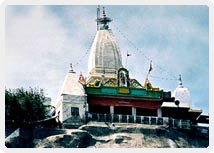 Atop the Bilwa Parvat is yet another sacred spot called the Mansa Devi temple, dedicated to the Goddess Mansa. another manifestation of Shakti. Cable cars that transport tourists to the shrine offer a panoramic view of the city, so this makes it all the more reason to visit it. The main temple enshrines two idols of the Goddess in her multi-armed forms. A trip to the Mansa temple is particularly significanct as it is believed that all the wishes of a sincere devotee are realized. It is a common sight to see devotees throng the shrine with the pooja kit of incense, flowers and all. The shrine is among the most prominent temples of North India. This temple is one of the most prominent Siddh Peethas, Holy Places where one's wishes are fulfilled, along with Chandi Devi and Maya Devi in Haridwar. Devotees tie hold threads on a tree on the temple precincts, praying for wish-fulfillment. The same thread is untied once the wish is fulfilled.
Atop the Bilwa Parvat is yet another sacred spot called the Mansa Devi temple, dedicated to the Goddess Mansa. another manifestation of Shakti. Cable cars that transport tourists to the shrine offer a panoramic view of the city, so this makes it all the more reason to visit it. The main temple enshrines two idols of the Goddess in her multi-armed forms. A trip to the Mansa temple is particularly significanct as it is believed that all the wishes of a sincere devotee are realized. It is a common sight to see devotees throng the shrine with the pooja kit of incense, flowers and all. The shrine is among the most prominent temples of North India. This temple is one of the most prominent Siddh Peethas, Holy Places where one's wishes are fulfilled, along with Chandi Devi and Maya Devi in Haridwar. Devotees tie hold threads on a tree on the temple precincts, praying for wish-fulfillment. The same thread is untied once the wish is fulfilled.
The Vaishnodevi shrine at Haridwar is a replica of the Maa Vashnodevi teme situated in Jammu. Vaishnodevi temple of Hardwar is a unique mixture of natural phenomenon and art.
Haridwar is home to one of the oldest universities in India, the Gurukul Kangri university , located on the banks of the river Ganga. It was founded in 1902 by Swami Shraddhananda, in keeping with the basic philosophies of Swami Dayanand Saraswati, the founder of Arya Samaj.This is where the Gurukul syste of Education is practiced, and a teacher student relationship unique toancient Indian educational traditionsAyurveda, Vedic scriptures and Sanskrit literature are all part of the curriculum, besides science and journalism. Its museum section displays some statues, coins, paintings, manuscripts and artefacts, right from Harappan times.
The Daksh Mahadev is an ancient temple situated in the south of Kankhal town. This temple was constructed by Queen Dhankaur in 1810 AD Kankhal is home to several temples and ashrams and the Daksh Mahadev is a prime tourist attraction.
Haridwar is the ideal place for a spiritual retreat and is home to several ashrams .The Jairam ashram houses a white statue depicting the samudra manthan, or the churning of the ocean to obtain nectar. Another well-known Ashram, the Sapta rishi ahramis a picturesque place near Haridwar, where seven great sages or Saptarishis, namely Kashyapa, Vashisht, Atri, Vishwamitra, Jamadagni, Bharadwaja and Gautam, are said to have meditated. Mythology tells us that Ganga split herself into seven currents at this point so that the Rishis would be able to meditate undisturbed.
Bhajans and instrumental music dominate the much-awaited evening aarti at the Ganges in Haridwar. Come sunset and the ritual unfolds, with diyas or lamps of different sizes culminating in a display of illumination, the lights a ceremonial tribute to the Godess. Ganga. The aarti is perfomed simultaneously at all temples in Haridwar. Flowers and candles floating on the river waters , post-aarti complete the ceremonial activity for the day.
Haridwar counts among the prominenet religious destinations of India and therefore plays host to landmark festivals, such as the kumbh and the ardh kumb mela. Other events worth mentioning are the Kavad Mela, Somvati Amavasya Mela,Gughal Mela that invited participation of lakhs of devotees.Haridwar hit the headlines in 1998 with the Maha Kumbh Mela for a holy dip in the Ganga.
How to get there
Haridwar, is well connected by roadto Delhi and Manapass. Nearest railway station is at Haridwar, with direct links to all major cities of India. The nearest is the Jolly Grant Airport at Dehradun.
Shopping
Ganga enters Haridwar from Rishikesh and brings to the tourists a variety of stones, which make good souvenirs from the holy town.They come in mind-boggling variety of shapes and sizes.These stones are also used to make miniature images of the Hindu gods. The main shopping centers are Moti Bazaar, Upper Road, Jwalapur, Kankhal.
Accommodation
Haridwar is home to several budget hotels and luxury hotels of an international standard and meets the requirements of the tourists. The Ginger Hotel and Hotel Classic Residency are the best bet if you’re not too worried about your budget while the Aleksandra Hotel and Hotel Midtown are among the economy class hotels.
Tajmahal Tours
Golden Triangle India
- Golden Triangle with Corbett
- Golden Triangle with Goa
- Golden Triangle with Kathmandu
- Golden Triangle with Wildlife
- Indian Heritage Tour with Tajmahal
- Buddhist Pilgrimage with Golden Griangle Tour
- Golden Triangle Tour
- Golden Triangle Tour with Haridwar and Rishikesh
- Golden Triangle with Khajuraho Varanasi
- Golden Triangle with Kashmir
- Tajmahal with Pushkar Fair
Delhi Tourism
Jaipur Tourism
Agra Tourism
Golden Triangle Extension
- Ranthambhor National Park
- Khajuraho Tourism
- Varanasi Tourism
- Rishikesh Tourism
- Haridwar Tourism
- Corbett Wildlife Sanctuary
- Mathura Travel
- Vrindavan Travel
- Gwalior Travel
Activities to Do
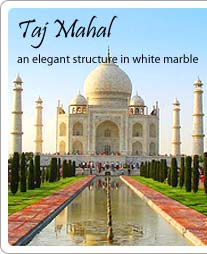

Copyright © 2020, www.tajmahal-india-tours.com
Recognized by Ministry of Tourism, Government of India
National Tourism Award Winner
Powered by SOFTTIX

